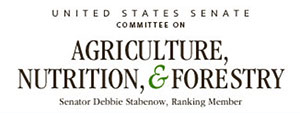
U.S. Senator Debbie Stabenow, Ranking Member of the U.S. Senate Committee on Agriculture, Nutrition, & Forestry, today released the following opening statement at the hearing titled “Agricultural Research and 2018 Farm Bill Implementation.”
Stabenow’s statement, as prepared for delivery, follows:
Thank you Chairman Roberts for holding this very important hearing. Dr. Hutchins, welcome back and thank you for being here. Agricultural research has always been the heart of the Department of Agriculture. In 1862, President Lincoln created the USDA with the mission to “procure, propagate, and distribute agricultural knowledge.”
That strong foundation created our modern system of land-grant universities, including, Mr. Chairman, our alma maters Michigan State and Kansas State. It has also led to breakthroughs that have made our farmers more productive, more profitable, and more resilient.
The development of the first hybrid corn seeds have resulted in better yields in many types of crops. Extension specialists helped farmers utilize crop rotation to replenish soil after the Dust Bowl. USDA studies have made wheat more resistant to drought and disease, developed more nutritious rice varieties, and improved vaccines to prevent foot and mouth disease.
Even off the farm, ag research has enhanced life for all Americans – improving the disposable diaper, making U.S. military uniforms resistant to mosquitos, and developing better turf for NFL fields – so my Detroit Lions can tear up the Chairman’s Kansas City Chiefs without tearing up the grass.
Even with these great innovations, we consistently hear that we need more research, not less. That’s why the bipartisan 2018 Farm Bill increased funding for USDA research efforts in animal disease, specialty crops, urban agriculture, organics, and expanded public-private partnerships in the Foundation for Food and Agriculture Research.
Unfortunately, the bipartisan commitment to agricultural research, which started over 150 years ago, is at risk. I am deeply concerned this Administration is undermining the foundation of the USDA’s scientific research mission.
The Administration’s haphazard decision to relocate two critically important research institutions – the Economic Research Service and the National Institute of Food and Agriculture – will affect real people who rely on USDA services and hamper its capacity to support farmers, families, and rural communities for years to come. And for what? It is still unclear to me what problem the USDA is trying to solve with this move. We do know what problems it is creating.
The Administration is requiring employees to uproot their families and move by September 30 – even though they haven’t secured a permanent office space. There are questions about their authority and budget for the relocation. According to the USDA, at least 63% of employees directed to move will leave instead of relocating. That’s on top of extremely high current vacancy rates at these agencies.
Rebuilding an entire workforce will take time. In the interim, these agencies will not have the capacity to do their important work.
The USDA will also lose irreplaceable expertise.
For example: The USDA is losing Vince Crawley, an army veteran originally from Indiana, whose work publishing reports is critical to expanding export markets, supporting transparent commodity prices, and strengthening rural economies. The USDA is losing Jeffrey Steiner, one of the nation’s leading experts on hemp research, whose knowledge would have helped develop new markets for hemp, which was legalized in the Farm Bill. The USDA is losing Tim Steenburg, whose economic research supports rural manufacturing and business innovation. His critical work on the competitiveness of rural America will shut down on September 30 because no one else at the Department is qualified to work with this confidential, highly sensitive data.
There are hundreds more stories like theirs that show the knowledge we’re throwing away. It’s no wonder that leading scientists, land-grant universities, and former USDA officials from both sides of the aisle stand in staunch opposition to this move.
The Administration could keep these experts from leaving by giving employees the flexibility to continue their important work here until a permanent location is ready. The Administration could extend the deadline for researchers to decide whether they will leave their jobs or relocate themselves and their families to a new city—over a thousand miles away. Instead, the Administration is forcing out its employees with rushed and politically-calculated ultimatums designed to derail important agricultural research.
This relocation fits a troubling pattern of this Administration undermining the important work of the USDA, including critical research our farmers need to address the impacts of the severe weather caused by the changing climate. Congress has resoundingly rejected multiple budget proposals that would have cut USDA economic research by 50%.
I am concerned that this so-called relocation is an attempt to go around Congress and carry out the steep reductions in capacity and research.
It’s clear to me that this is not a relocation. It’s a demolition. It’s a thinly-veiled, ideological attempt to drive away key USDA employees and bypass the intent of Congress.
I urge the Administration to stop this and salvage what valuable expertise is left. This decision does far more than hurt USDA employees. If this chaotic plan is not stopped, our farmers, families, and rural communities will be the ones that suffer the most in the long-run.
Thank you.


